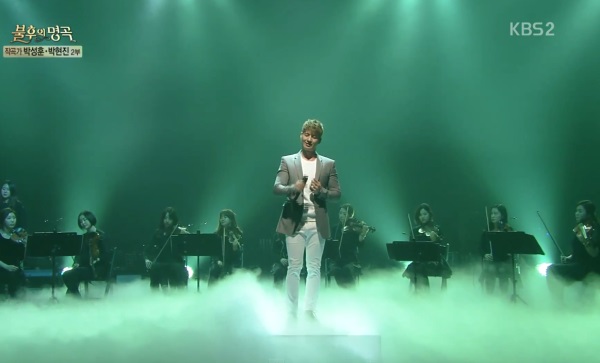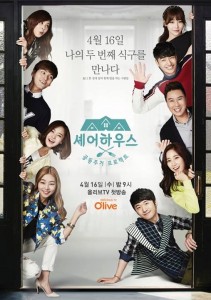 Korean cable channel O’live has been affectionately dubbed as “delicious tv” owing to its (quite understandable) fixation with good eats. A dedicated food network under the management of entertainment conglomerate CJ E&M, it has produced a slew of hit culinary programmes such as The Cook Off and Masterchef Korea.
Korean cable channel O’live has been affectionately dubbed as “delicious tv” owing to its (quite understandable) fixation with good eats. A dedicated food network under the management of entertainment conglomerate CJ E&M, it has produced a slew of hit culinary programmes such as The Cook Off and Masterchef Korea.
Recently, something not nearly as palatable to viewer tastes hit the small screen in O’live’s latest offering, Share House. According to the official CJ E&M press release, the programme seeks to present a reality show spin on the singles TV trend as celebrity singles living together in a shared house grow to become like family over the connecting medium of food.
Ostensibly, the concept seems to be a fairly warm and light-hearted one — two of the objectives stated for the show were “sympathy” and healing”, with g.o.d member Son Ho-young joining the show to mark his return to the entertainment industry after personal tragedies.
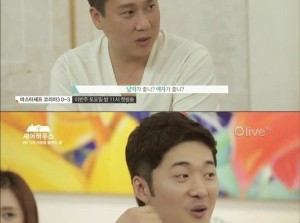 In the episode that aired in Korea on May 7, however, events on the show took a particularly distasteful turn. Cast member and fashion designer Kim Jae-woong (of Project Runway Korea fame) had, since the pilot episode, been instructed by the other celebrities on the show “change [his] voice to be more masculine”. In a discomfiting turn of events, singer Lee Sang-min cornered Kim Jae-woong after the latter arrived from a personal engagement with a female acquaintance, asking him completely impersonal and entirely broadcast-appropriate questions: “Be honest, do you like men? Or women?”
In the episode that aired in Korea on May 7, however, events on the show took a particularly distasteful turn. Cast member and fashion designer Kim Jae-woong (of Project Runway Korea fame) had, since the pilot episode, been instructed by the other celebrities on the show “change [his] voice to be more masculine”. In a discomfiting turn of events, singer Lee Sang-min cornered Kim Jae-woong after the latter arrived from a personal engagement with a female acquaintance, asking him completely impersonal and entirely broadcast-appropriate questions: “Be honest, do you like men? Or women?”
When he (quite naturally and understandably) told the other cast members that it was frankly none of their business, they responded that he was “just being overly sensitive” (!!!!). The whole incident ended with a (completely voluntary, of course) “confession” from Kim Jae-woong after sufficient group pressure and time alone, which really must be quoted in full:
“I’m the same man as Sang-min hyung, [Choi] Sung-joon hyung, and Ho-young hyung but there’s one difference between me and them and it’s that I like men. I’ve always been asked by others ‘what am I’ since I was little. I am not a monster.”
Help us all.
Let’s take a step back and think about this, shall we?
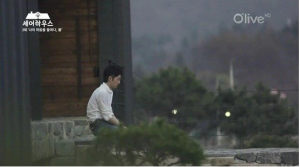 First of all, what on earth were the producers thinking in allowing this to air on national television? Regardless of the motivations (to be discussed later), twisted or otherwise, of the powers that be in charge of this show, why on earth should a situation of aggressive social coercion such as this be aired?
First of all, what on earth were the producers thinking in allowing this to air on national television? Regardless of the motivations (to be discussed later), twisted or otherwise, of the powers that be in charge of this show, why on earth should a situation of aggressive social coercion such as this be aired?
Everyone who watches television knows reality shows aren’t as much about reality per se as they are about the reality the editing room chooses to construct. This could easily have been cut out with a simple click and attendant shaking of heads — but was not (more on this later.)
Furthermore, as evidenced by his time spent in isolation on the balcony before revealing his sexual orientation, as well as the heartbreaking wording of his “confession” — “I am not a monster” –, this clearly was not something that he shared without care or concern. It was clearly a struggle to voice this out, and it was a reveal made under duress.
Having been put under sufficient social pressure to out himself, however, and the reveal was aired on national television. This is reality TV, after all, and those producers are sharks — anything for the ratings! Given the continued curiosity of the other cast members, he probably decided that the completely Kim Jae-woong’s right to personal privacy and to make the distinction between his personal and public personas were thus sacrificed at the altars of social expectations — satisfy our curiosity or die! — and the CJ E&M bank account.
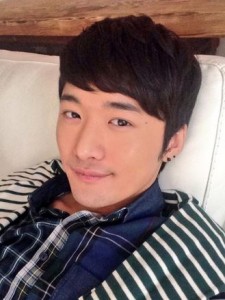 Apparently, since the airing of the episode, Kim Jae-woong himself has issued statements such as “I’m confident. Since the beginning, I had no thought of hiding it. I only talked about it because the situation turned out this way” and that ” The scene might have looked like the Share House family members unintentionally preyed on me, but I’m really thankful and I love the Share House family who cared and supported me more than anyone else.” So apparently he’s okay in the aftermath — but does not “the situation turned out this way” reek of production team manipulation?
Apparently, since the airing of the episode, Kim Jae-woong himself has issued statements such as “I’m confident. Since the beginning, I had no thought of hiding it. I only talked about it because the situation turned out this way” and that ” The scene might have looked like the Share House family members unintentionally preyed on me, but I’m really thankful and I love the Share House family who cared and supported me more than anyone else.” So apparently he’s okay in the aftermath — but does not “the situation turned out this way” reek of production team manipulation?
Regardless, though, it was a particularly insensitive portrayal of an individual coming out, and the blame for this lies largely at the feet of the production team. If the producers fancied themselves progressive by openly raising the issue of non-heterosexual (still a largely touchy issue shied away from by most broadcast channels) orientations on national television, then this was a particularly distasteful and indelicate way of approaching the issue.
Even worse would be the possibility that the entire “confession” was staged, with consent from Kim Jae-woong himself. It’s almost like a Möbius strip of appallingly warped thinking: were the cast and crew deliberately aiming to be offensive and make the coming-out seem more of an emotional and social struggle to generate public sympathy for the LGBT community?
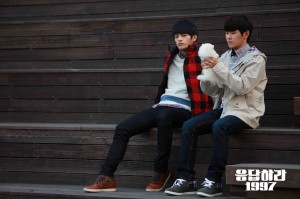 In any case, forcing the idea of “openness” only masquerades as genuine open-mindedness. Rather than portraying a thoughtful presentation of non-heterosexual relationships and lifestyles a la Answer Me 1997, non-heterosexual individuals such as designer Kim are presented as victimised. While he, at least publicly, was not much affected by his coming out on national television, the situation of social coercion through which his sexuality was revealed was highly aggressive to the individual of alternative orientation.
In any case, forcing the idea of “openness” only masquerades as genuine open-mindedness. Rather than portraying a thoughtful presentation of non-heterosexual relationships and lifestyles a la Answer Me 1997, non-heterosexual individuals such as designer Kim are presented as victimised. While he, at least publicly, was not much affected by his coming out on national television, the situation of social coercion through which his sexuality was revealed was highly aggressive to the individual of alternative orientation.
Regardless of the actual machinations behind the programme, the episode portrayed Kim as a marginalised and pressurised individual rather than one, say, confident and self-assured in his sexuality. In short, while it may have offered Kim Jae-woong a platform, however discomfiting, to reveal his sexuality, it did little or no good in terms of aiding the LGBT cause overall.
Openly gay director Kim Jho Kwang-soo concurred in a post on Twitter:
김재웅씨의 커밍아웃을 환영합니다. 당당한 그가 커밍아웃 이후 더 행복하길 바랍니다. 우리는 다수와 다를 뿐 존재 자체로 행복할 수 있으니까요. 그렇지만 ‘셰어하우스’의 태도에 대해서는 비판할 수 밖에 없네요. 진심으로 사과하세요.
— 김조광수 (@kimjhogwangsoo) May 8, 2014
“I welcome Kim Jae Woong’s coming out. He showed dignity and I hope he will be happier after his coming out because we can be happy through an existence itself that is only different from the majority. Still, I can do nothing but criticise Share House‘s behavior. Please apologise with sincerity.”
We as viewers have little or no control over what goes on in the editing room. But the point here is this — regardless of one’s personal convictions regarding sexual orientation, no one should ever be dehumanised or have their dignity reduced on account of their sexuality. The entertainment industry, with its access to literally every home with a television set, needs to present affirming and empowering portrayals of non-heterosexual individuals, rather than portraying them as marginalised and victimised.
Even if we cannot immediately alter the industry itself, the feedback loop of media and society ensures that we can alter our individual perceptions to influence it. Slowly, eventually, the entertainment industry can and will change.
Dear Kim Jae-woong, you are not a monster.
None of us are.
(CJ E&M, Nate, O’live, Twitter, Images via CJ E&M, O’live, tvN)


